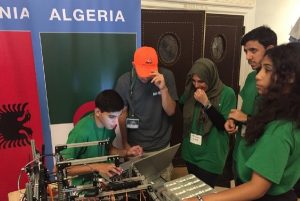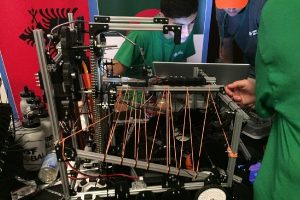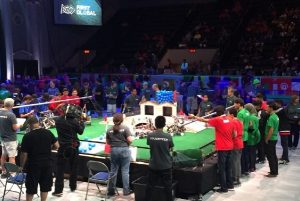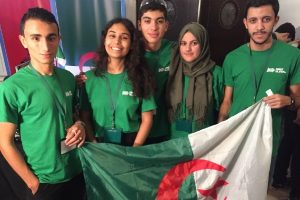-
What We Do
- WHERE WE WORK
-
About Us
 Welcome Message from Carol Jenkins
Welcome Message from Carol JenkinsFor more than 90 years, World Learning has equipped individuals and institutions to address the world’s most pressing problems. We believe that, working together with our partners, we can change this world for the better.
On my travels, I’ve had the opportunity to meet with many of those who have joined us in this mission. In Baghdad, we’ve trained more than 2,300 Iraqi youth who are already giving back at home. In London, our partners in the TAAP Initiative strongly believe that we are all responsible to practice inclusion. And in Vermont, our Experiment in International Living and School for International Training participants prove every day that they have the tools and the determination to change the world.
Please join us in our pursuit of a more peaceful and just world.
- Get Involved
Media Center > Story
How a Robotics Competition Could Transform Algeria – And the World
August 1, 2017
The Algerian robotics team looked worried as they huddled around their boxy machine. It was the opening day of the First Global international robotics challenge — which brought youth from 160 countries to Washington, D.C. in July to compete and test their mechanical engineering skills — and the robot had gone offline with minutes to go before their first match.
“There’s nothing we can do,” said Sara Narimene Boukais, an 18-year-old student from Algiers. The robot had disconnected from the patchy Wifi in the D.A.R. Constitution Hall; the team would just have to wait for it to reconnect. Accepting that reality, the four team members picked up their robot and carried it into the cool, dark auditorium.
Frustrating, yes. But this ordeal was exactly the point of the inaugural First Global Challenge. Officially billed as an exercise to “ignite a passion” for science, technology, engineering, and mathematics (STEM) among the world’s youth, the Olympic-style competition has an even loftier aim: to encourage the next generation to collaborate toward resolving critical global issues using their STEM skills. Dealing with stress, working together productively, solving problems — and even just realizing when to move on to a different problem — are just as much a part of the competition as scoring points. “Those are called learning opportunities,” explained volunteer and head judge Andy Marshall.
Participants and organizers alike believe this event is poised to spur global transformation. In Algeria alone, the competition’s emphasis on STEM skills could create new opportunities for a workforce facing serious challenges. But the hope is that positive local changes in Algeria and elsewhere will ripple out across the world, strengthening diplomacy and cooperation, and inspiring innovation with a moral bent.
Supporting communities with STEM education

None of the members of Team Algeria had experience in robotics before preparation for this competition got underway. Some had dabbled in coding and computer science, but the principles of mechanical engineering and real-world applications of computer science were as opaque to them as the next person. Yet they had only months to build a robot that could move across a field, pick up small blue and orange plastic balls, sort them by color, and drop them into the correct bin.
“We didn’t know that [color sensors existed] six months ago,” said Cyrine Souffi, 17. Now, though, the team has the capacity to troubleshoot why the color sensor stopped working in their first match. They’ve learned these skills and more throughout their months of working together at the Algier’s STEAM Resource and Training Center, a community center run by the nonprofit World Learning where students can work on real-world problems using an interdisciplinary approach incorporating Science, Technology, Engineering, Art, and Mathematics (STEAM).
STEAM skills have been increasingly seen as critical to international development, particularly in countries like Algeria, which has grappled with unemployment for years. According to Al Jazeera, one young person in three is unemployed in the North African country. To help alleviate the unemployment crisis, Algeria is turning to STEAM education. Last year, World Learning opened its STEAM center to prepare Algeria’s young people for careers in modern industry. The center offers workshops in everything from coding to leadership skills to more than 300 students — and it also assembled Algeria’s first-ever robotics team for the First Global Challenge.
“The STEAM center shows you what you’re really passionate about,” Souffi said. Though Souffi was originally attracted to the STEAM center to learn the real-life applications of coding — having previously participated in Code Academy and Tech Girls — she joined the robotics team on a whim. It was there that she learned she has a flair for robotics. Such was the case as well for Rafik Amrani, the 17-year-old team captain who also came to the STEAM center as a coder. “With robotics, I saw why we code,” he said.
These kinds of opportunities are new to Algeria, says Mohamed Ould Sad Saoud, education specialist for World Learning Algeria. He wants to make sure the next generation and those to come will continue to have opportunities to explore the various fields of science and technology, find their own passions, and broaden their perspectives on the world. “It makes me happy seeing these opportunities happening now,” he said. “I see it as my contribution to make the world a better place.”
Fostering global cooperation
While his team got into place for their second match, Nabil Dabouz stood with Team Lebanon — who were clad in rainbow afro spirit wigs — discussing strategy for working together. Just before the buzzer signaled to get started, they slapped hands in agreement and he rejoined his team.

It was perhaps an unlikely development for the 18-year-old from Algiers, who says he struggled to communicate with his own team at the start of their robotics journey. With a background in computer science, Dabouz tended to fixate on perfecting small aspects of the robot’s design; he found it frustrating when the rest of his team wanted to move on to bigger problems. But those disagreements never became contentious and, over time, communicating became easier. Before departing for D.C., the team appointed him their chief strategist to work with other teams in the competition.
Collaboration is baked directly into the design of the First Global Challenge. Students must build robots to meet certain specifications and abilities, yes, but they also must learn to work together to win points. Upon arrival in D.C., teams are sorted into two major international alliances; each match pits three times from each alliance against one another, making strategic cooperation a valuable aspect of gameplay. One team’s strength could compensate for and complement the shortcomings of an alliance member.

That’s been important for Team Algeria. As the team learned upon arriving in Washington, their robot had a few shortcomings. With baccalaureate exams falling in the middle of the preparation period, they hadn’t had time to build a replica of the field that the Challenge would be using: a river with a bridge running over it and plastic balls representing clean and contaminated water throughout. It wasn’t until it was too late that Team Algeria discovered problems like the fact the bridge was too steep for their robot to climb. Another member their alliance would have to take on that task for them.
That was no problem. A strong Hall of Nations vibe pulses through the hallway that runs the perimeter of the Constitution Hall auditorium. Teams from Cyprus and Croatia take selfies together while it seems nearly every student spends free moments collecting signatures from around the world as souvenirs. Some teams hand out actual souvenirs, too, like the batik picture frame that a member of Team Indonesia brought to the Algerian team. “The event is about this,” Saoud says, gesturing around him. “Not that,” he adds, pointing to the auditorium doors.
His students agree. For most of them, this is their first time traveling abroad. Boukais had never traveled at all before and admits to having felt a little apprehensive about the trip before she left. She had assumed people who grew up elsewhere were too different from her and that they could never live together the way they were about to do. “But we actually can,” she said. “I didn’t know it was like this.”
Even Souffi, who visited the U.S. on a cultural exchange last summer, learned something new. “This experience has shown me how big the world is, how different our cultures are, and how exciting it is to discover this world,” Souffi said. “But I’ve also learned that we are all the same, even if we are from different countries and talk different languages. We’re still humans. We’re still standing up with each other. And we’re all here for one thing, which is robotics.”
Inspiring a better kind of technological revolution

On the last day of the competition, teams of teenagers flooded the floor of the auditorium clad in bright colors and waving their national flags in the air. They had gathered for the closing ceremony, eager to learn the winners of the First Global Challenge — which were not just for robotics skills, but also qualities like unity, courage, and a team’s personal journey. Despite winning their last match, Team Algeria wasn’t up for any awards. But they weren’t too disappointed. “We won the experience,” Amrani said.
Then World Bank President Jim Yong Kim took the stage to deliver the keynote address. “Watching the machines that you’ve built was so impressive to me,” he began. “But the estimates of our economists and scientists at the World Bank suggest that automation, technology, and artificial intelligence will eliminate half to two-thirds of all the existing jobs in developing countries.” The problem is grave, he said. But the solution might be in that very auditorium.
“You can be the generation that solves the most difficult problems in the world,” Kim said. “But you can only do it if you study science, technology, engineering, and math and then link that with the moral vision of giving everyone in the world the opportunity to live the kind of life that they want.” He encouraged them to use their STEM skills to create new jobs for the world’s poorest people and to address crises like climate change. “Water is going to be the issue that literally kills people because of climate change,” he said.“You guys can solve that problem.”
Just as cooperation was integral to the First Global Challenge, so was the incentive to address the coming water crisis. Each robot’s purpose was to decontaminate the river in the playing field and provide clean water to the villages on either side of the embankment. That focus taught Team Algeria how to use their STEM skills for the greater good even before Kim’s keynote address. “I saw how powerful robotics are,” Boukais said. “We can do a lot with robotics. We can improve others’ lives.”
This is just the beginning for robotics in Algeria. The team will give presentations on their experience to younger students involved in summer programs through the U.S. Embassy. Saoud says World Learning and the STEAM center are determined to reach people outside of the capital; he’s hoping they’ll be able to launch a national robotics competition so that next year’s team at the First Global Challenge in Mexico City will be composed of teenagers from all regions of the country.
It seems they’ll have the help of this year’s crop of students. “Our main goal is to help our community so as to make a better life,” Boukais said. Souffi agrees. She and a friend from home have already been discussing ways to reach out to youth across Algeria to teach them robotics. “I want to show the youth we can do a lot more,” Souffi said. “We have to think globally.”





